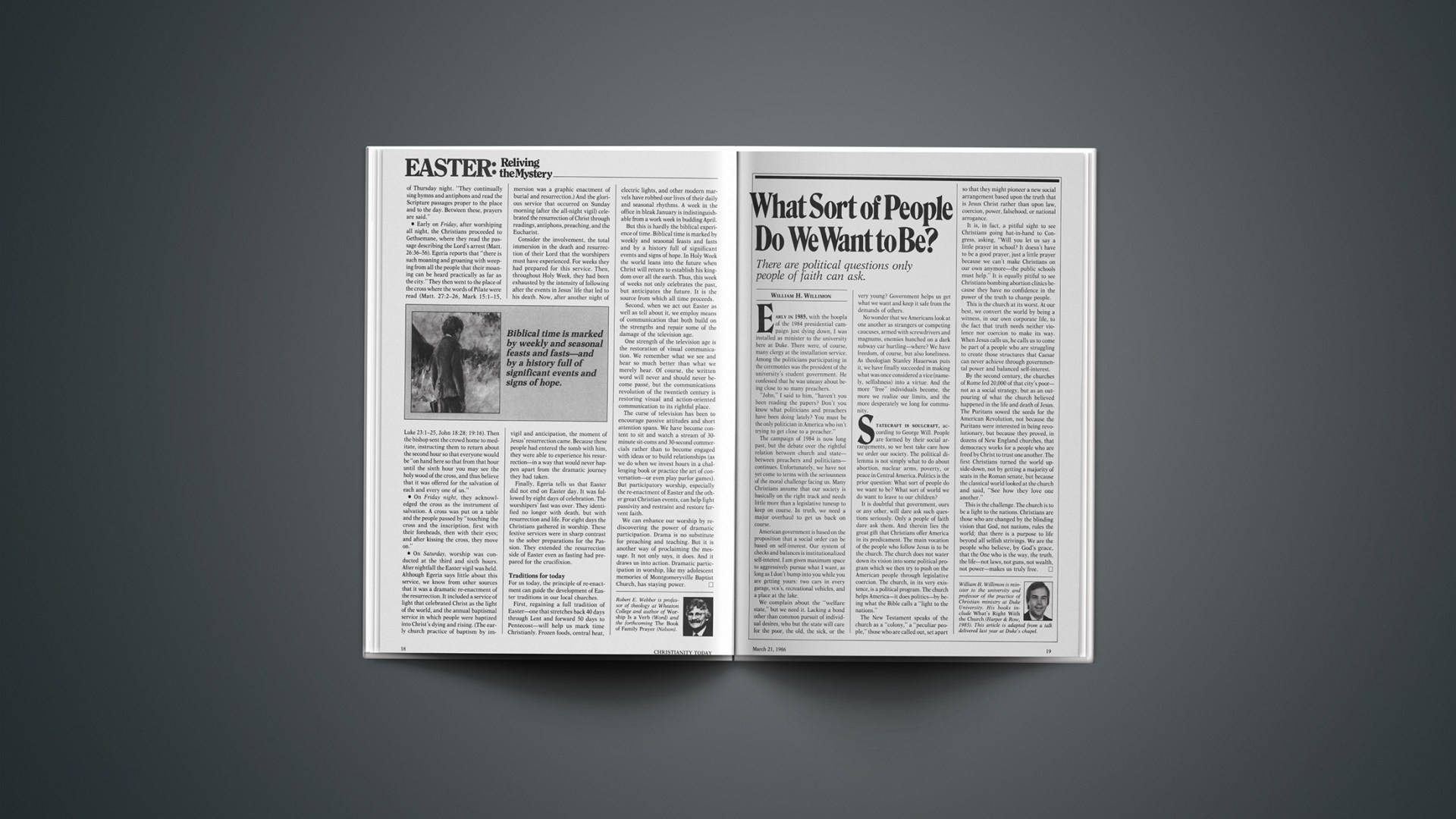Early in 1985, with the hoopla of the 1984 presidential campaign just dying down, I was installed as minister to the university here at Duke. There were, of course, many clergy at the installation service. Among the politicians participating in the ceremonies was the president of the university’s student government. He confessed that he was uneasy about being close to so many preachers.
“John,” I said to him, “haven’t you been reading the papers? Don’t you know what politicians and preachers have been doing lately? You must be the only politician in America who isn’t trying to get close to a preacher.”
The campaign of 1984 is now long past, but the debate over the rightful relation between church and state—between preachers and politicians—continues. Unfortunately, we have not yet come to terms with the seriousness of the moral challenge facing us. Many Christians assume that our society is basically on the right track and needs little more than a legislative tuneup to keep on course. In truth, we need a major overhaul to get us back on course.
American government is based on the proposition that a social order can be based on self-interest. Our system of checks and balances is institutionalized self-interest. I am given maximum space to aggressively pursue what I want, as long as I don’t bump into you while you are getting yours: two cars in every garage, VCR’s, recreational vehicles, and a place at the lake.
We complain about the “welfare state,” but we need it. Lacking a bond other than common pursuit of individual desires, who but the state will care for the poor, the old, the sick, or the very young? Government helps us get what we want and keep it safe from the demands of others.
No wonder that we Americans look at one another as strangers or competing caucuses, armed with screwdrivers and magnums, enemies hunched on a dark subway car hurtling—where? We have freedom, of course, but also loneliness. As theologian Stanley Hauerwas puts it, we have finally succeeded in making what was once considered a vice (namely, selfishness) into a virtue. And the more “free” individuals become, the more we realize our limits, and the more desperately we long for community.
Statecraft is soulcraft, according to George Will. People are formed by their social arrangements, so we best take care how we order our society. The political dilemma is not simply what to do about abortion, nuclear arms, poverty, or peace in Central America. Politics is the prior question: What sort of people do we want to be? What sort of world we do want to leave to our children?
It is doubtful that government, ours or any other, will dare ask such questions seriously. Only a people of faith dare ask them. And therein lies the great gift that Christians offer America in its predicament. The main vocation of the people who follow Jesus is to be the church. The church does not water down its vision into some political program which we then try to push on the American people through legislative coercion. The church, in its very existence, is a political program. The church helps America—it does politics—by being what the Bible calls a “light to the nations.”
The New Testament speaks of the church as a “colony,” a “peculiar people,” those who are called out, set apart so that they might pioneer a new social arrangement based upon the truth that is Jesus Christ rather than upon law, coercion, power, falsehood, or national arrogance.
It is, in fact, a pitiful sight to see Christians going hat-in-hand to Congress, asking, “Will you let us say a little prayer in school? It doesn’t have to be a good prayer, just a little prayer because we can’t make Christians on our own anymore—the public schools must help.” It is equally pitiful to see Christians bombing abortion clinics because they have no confidence in the power of the truth to change people.
This is the church at its worst. At our best, we convert the world by being a witness, in our own corporate life, to the fact that truth needs neither violence nor coercion to make its way. When Jesus calls us, he calls us to come be part of a people who are struggling to create those structures that Caesar can never achieve through governmental power and balanced self-interest.
By the second century, the churches of Rome fed 20,000 of that city’s poor—not as a social strategy, but as an outpouring of what the church believed happened in the life and death of Jesus. The Puritans sowed the seeds for the American Revolution, not because the Puritans were interested in being revolutionary, but because they proved, in dozens of New England churches, that democracy works for a people who are freed by Christ to trust one another. The first Christians turned the world upside-down, not by getting a majority of seats in the Roman senate, but because the classical world looked at the church and said, “See how they love one another.”
This is the challenge. The church is to be a light to the nations. Christians are those who are changed by the blinding vision that God, not nations, rules the world; that there is a purpose to life beyond all selfish strivings. We are the people who believe, by God’s grace, that the One who is the way, the truth, the life—not laws, not guns, not wealth, not power—makes us truly free.
WILLIAM H. WILLIMON1William H. Willimon is minister to the university and professor of the practice of Christian ministry at Duke University. His books include What’s Right With the Church (Harper & Row, 1985). This article is adapted from a talk delivered last year at Duke’s chapel.









